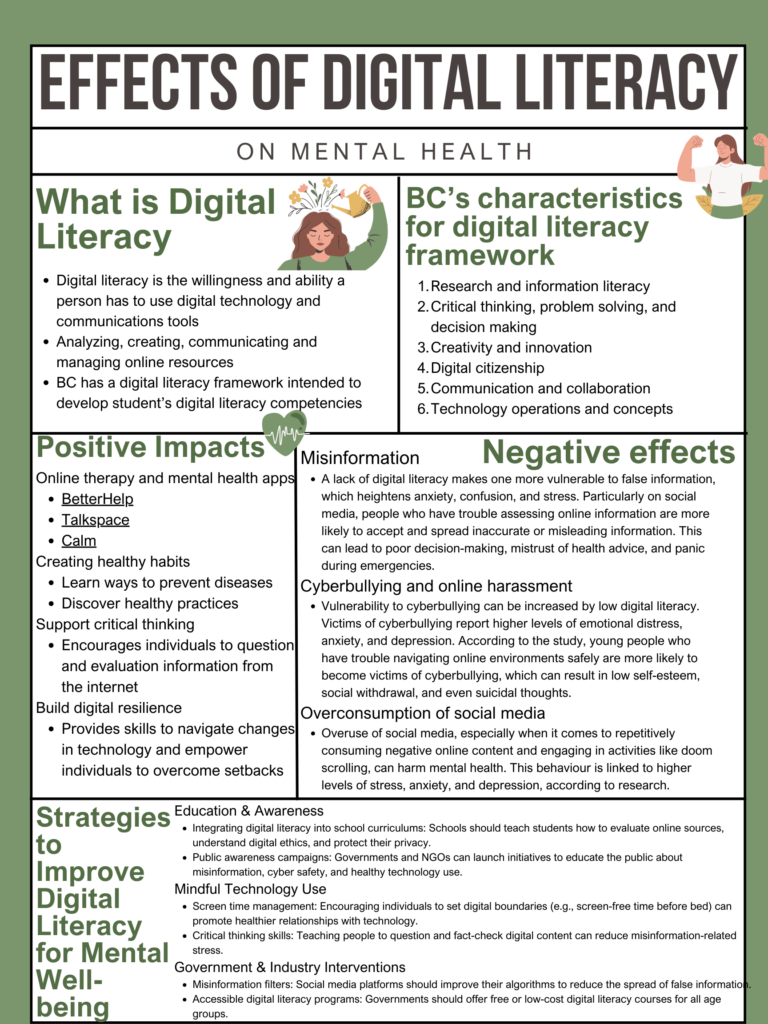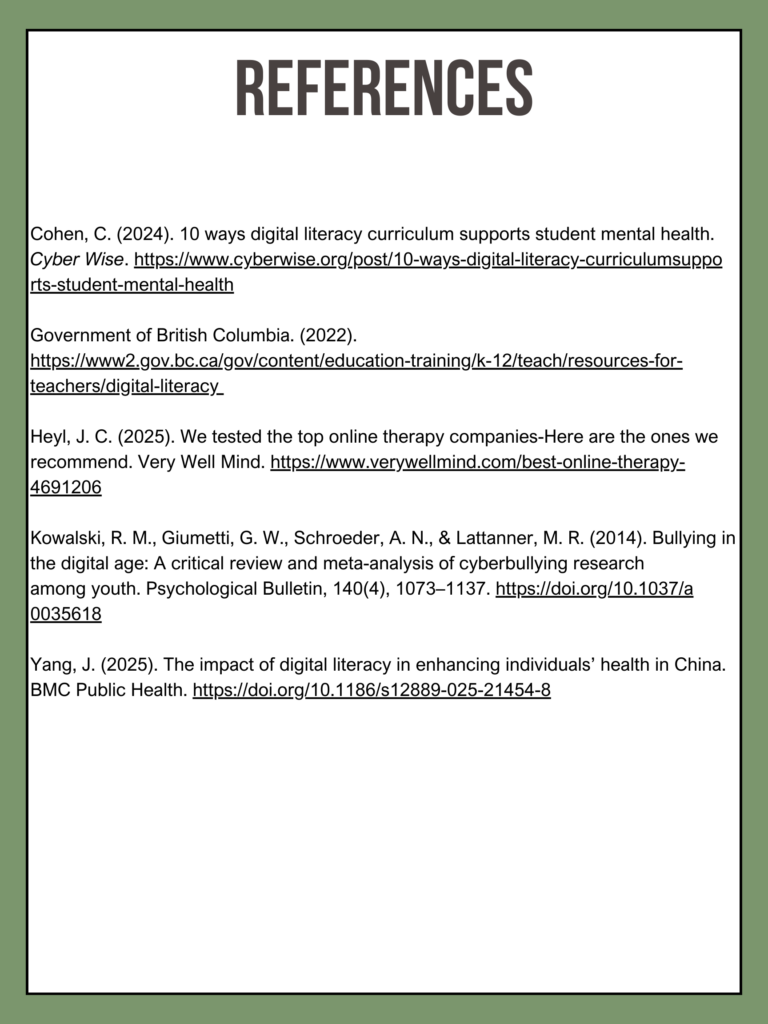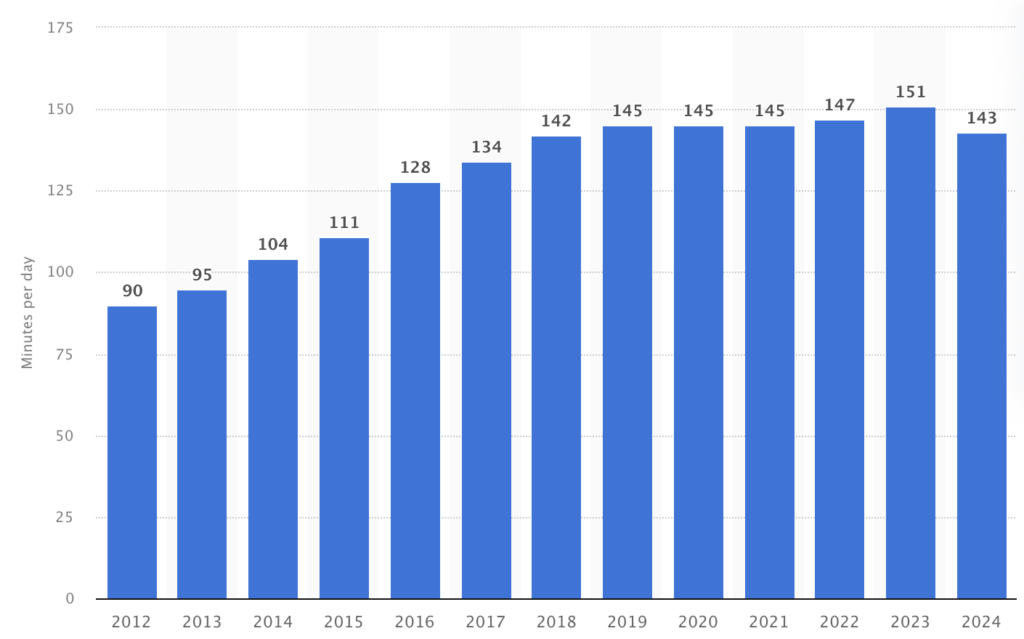

EDCI 136
This is the category to apply to your Inquiry posts.


As we wrap up the end of our research on the effects of digital literacy on mental health, this week I focused on the positive impacts of digital literacy. Before starting my research, I tried brainstorming ways I though digital literacy could be beneficial, but I could not think of anything. I think a lot of people, including myself, only view digital literacy or social media as something that negatively effects mental health. However, doing this extensive research allowed me to find ways in which it can be useful, which I think is important for everyone to know. My teammate and I have decided to present our learnings on an infographic. We chose this style of media as we believe it will attract more people to read it due to the simplicity of it. We want everyone to be aware of the positive impacts of digital literacy, and how they can utilise it to their advantage.
As discussed in my Deeper Dive Inquiry 2, online therapy is a very useful and accessible tool for those struggling with mental health. This week I wanted to research even more positive aspects of digital literacy. According to Yang (2025), digital literacy has proven to have positive impacts on physical and mental health by improving the quality of an employee, increasing income and enhancing informal social support. Their research also concluded that positive effects were seen more for older participants due to the facilitation of online communication which reduces the feeling of loneliness and depression. It can be more difficult to identify depression in older adults, therefor it is important for digital literacy to serve as a tool where anyone of any age can find the resources they need. I particularly like this video I found by the National Institute on Aging that provides great tips to help with feeling lonely.
Yang (2025) explains how workplaces should enhance their use of digital literacy to reduce stress employees may have regarding the digital media they use. The article also highlights the importance of the social support digital literacy provides for those struggling with mental health.
My research has shown me there are many ways mental health can be positively impacted by digital literacy, but the most important is the availability of resources.
References
National Institute on Aging. (2021, November 23). Stay Connected to Combat Loneliness and Social Isolation [Video]. YouTube. https://www.youtube.com/watch?v=-hKUHiIwbrM
Yang, J. (2025). The impact of digital literacy in enhancing individuals’ health in China. BMC Public Health. https://doi.org/10.1186/s12889-025-21454-8
My learning on the effects of digital media on mental health was centered around the use of online therapy and mental health platforms. These platforms are a positive way our society can utilize digital media. Having access at any given time to resources that benefit our well-being can be extremely helpful for those who are struggling. This allows people to get the help they need for a much lower cost and more convenient way than in-person therapy. The best apps I have gathered are BetterHelp, Talkspace and Calm. According to Heyl (2025), these are some of the best online therapy resources that are convenient and comprehensive.
Resources that I consult often and find very beneficial are podcasts, specifically Mel Robbins. Her podcast contains such valuable information that can truly change a person’s life for the better. I enjoy listening to them in the car or while getting ready to put me in a good headspace and inspire me. Countless people have had amazing results from the information she shares and the guests she brings on her show. One trick that has stuck out to me from listening to her podcast over the last year is a tool she calls the 5 seconds rule. A specific podcast related to mental health from her I believe is very valuable is The ONE Trick You Need to Master to Live a Peaceful and Fulfilled Life | The Let Them Theory. I listened to this podcast one morning on my way to school and the message truly clicked for me. She explains this concept of the ‘let them theory’ which essentially just means when someone is doing something that bothers you, let them. This put into perspective for me that most things are out of my control and I should not worry about what other people are doing. This podcast is just one example of how digital media has helped my well-being, and a resource I would highly suggest to anyone looking for help.
My research this week has opened me to many new platforms that I can use during challenging times, as well as provide to those around me. I am happy to be able to provide these resources in my inquiry in hopes that people struggling with mental health or struggling to find purpose in digital media can get the answers and help they need.
Heyl, J. C. (2025). We tested the top online therapy companies-Here are the ones we recommend. Very Well Mind. https://www.verywellmind.com/best-online-therapy-4691206
The topic my teammate and I have chosen for our inquiry is the effects of digital media on mental health. Through this process, we hope to learn how digital media impacts mental health both positively and negatively. We will gather our information from various sources such as academic articles, podcasts, and YouTube videos. To present our learnings, we have decided to create an infographic which will display our information in a clear way that will be easy for others to follow. We will be using Canva to design our infographic and create a visually appealing paper. Our goal is to learn about the effects on mental health and share this with others in hopes of reducing the harm caused by digital media.
According to Hilbert College (2024), digital media can be represented through video, audio, text, mixed media, images and graphics. This digital media is mostly displayed and shared on social media. Reports from Statista (Dixon, 2024) shows that in 2024, people ages 16-64 across the world spent on average 143 minutes on social media every day. I think any activity that someone partakes in for this much time everyday has a major impact on their mental health.

Our findings thus far have been very interesting and I look forward to continuing this research.
Hilbert College. (2024). 5 types of digital media. https://online.hilbert.edu/blog/types-of-digital-media/
Dixon, S. J. (2024). Daily time spent on social networking by internet users worldwide from 2012 to 2024. Statista. https://www.statista.com/statistics/433871/daily-social-media-usage-worldwide/
My team and I will be doing our inquiry project on the effects of digital media on mental health.
© 2025 Stephany's Blog
Theme by Anders Noren — Up ↑